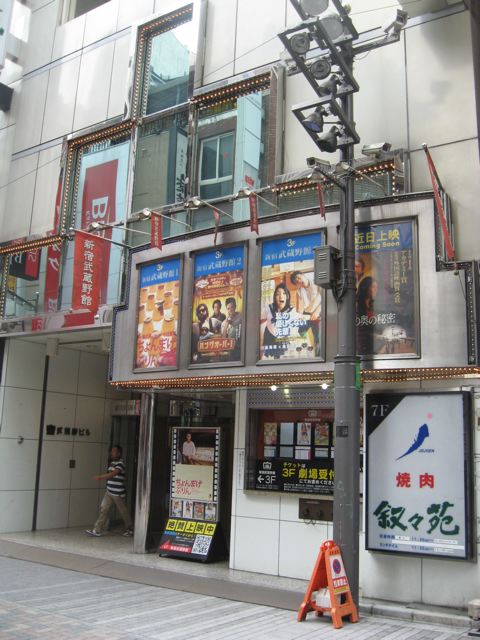Musashinokan on:
[Wikipedia]
[Google]
[Amazon]
 The is a long-standing
The is a long-standing
Shinjuku Musashinokan
Official page
The Musashinokan pamphlet in the 1920s (in Japanese) Cinemas in Tokyo Theatres completed in 1920 1920 establishments in Japan Buildings and structures in Shinjuku {{Japan-theat-struct-stub
 The is a long-standing
The is a long-standing movie theater
A movie theater (American English), cinema (British English), or cinema hall ( Indian English), also known as a movie house, picture house, the movies, the pictures, picture theater, the silver screen, the big screen, or simply theater is a ...
located on the east side of Shinjuku Station
is a major railway station in the Shinjuku and Shibuya wards in Tokyo, Japan. In Shinjuku, it is part of the Nishi-Shinjuku and Shinjuku districts. In Shibuya, it is located in the Yoyogi and Sendagaya districts. It is the world's busiest rai ...
in Tokyo
Tokyo (; ja, 東京, , ), officially the Tokyo Metropolis ( ja, 東京都, label=none, ), is the capital and largest city of Japan. Formerly known as Edo, its metropolitan area () is the most populous in the world, with an estimated 37.468 ...
, Japan
Japan ( ja, 日本, or , and formally , ''Nihonkoku'') is an island country in East Asia. It is situated in the northwest Pacific Ocean, and is bordered on the west by the Sea of Japan, while extending from the Sea of Okhotsk in the north ...
. Originally started as the Musashinokan in May 1920, it quickly became Tokyo's premiere independent high-class theater showing foreign films. The theater program featured top-level film criticism and a committee of the managers and of film critics
Film criticism is the analysis and evaluation of films and the film medium. In general, film criticism can be divided into two categories: journalistic criticism that appears regularly in newspapers, magazines and other popular mass-media outlets ...
such as Akira Iwasaki (18 November 1903 – 16 September 1981) was a prominent left-wing Japanese film critic, historian, and producer. Born in Tokyo, he became interested in film from his student days at Tokyo University. Early on, he helped introduce German experimen ...
helped program the films shown there. It was also famous in the silent era for the erudite benshi
were Japanese performers who provided live narration for silent films (both Japanese films and Western films). ''Benshi'' are sometimes called or .
Role
The earliest films available for public display were produced by Western studios, portraying ...
narration of Musei Tokugawa
was a Japanese benshi, actor, raconteur, essayist, and radio and television personality. Musei (as he was called) first came to prominence as a benshi, a narrator of films during the silent era in Japan. He was celebrated for his restrained but e ...
. On occasion, it also showed Japanese films such as Teinosuke Kinugasa
was a Japanese filmmaker. He was born in Kameyama, Mie Prefecture and died in Kyoto. Kinugasa won the 1954 Palme d'or at the Cannes Film Festival for '' Gate of Hell''. Biography
Kinugasa began his career as an onnagata (actor specializing in f ...
's '' A Page of Madness''.
When it was rebuilt in 1968 as part of a multi-purpose building, occupying the seventh floor, it changed its name to the Shinjuku Musashinokan. Its owner, Musashino Kōgyō, also started other theaters using the name, such as the Ōi Musashinokan and the Nakano Musashinokan.
The Shinjuku Musashinokan still operates as a theater showing films on three screens.
Notes
External links
Shinjuku Musashinokan
Official page
The Musashinokan pamphlet in the 1920s (in Japanese) Cinemas in Tokyo Theatres completed in 1920 1920 establishments in Japan Buildings and structures in Shinjuku {{Japan-theat-struct-stub